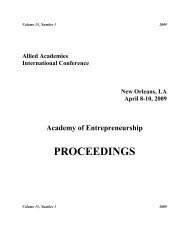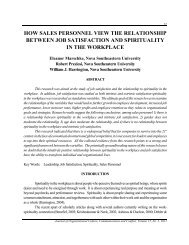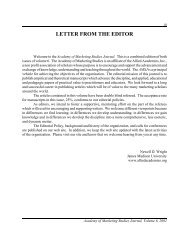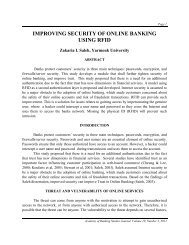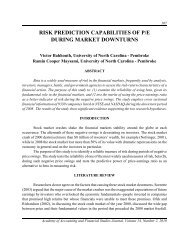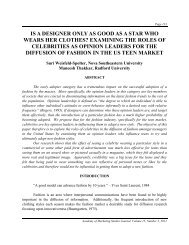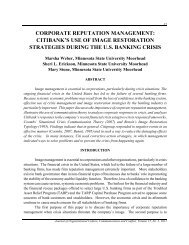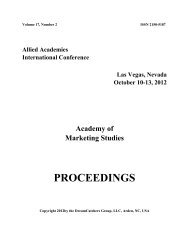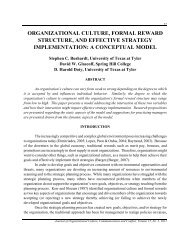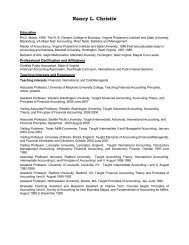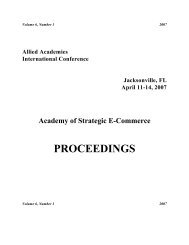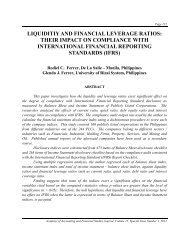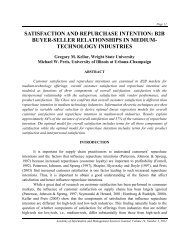factors influencing faculty research productivity - Allied Academies
factors influencing faculty research productivity - Allied Academies
factors influencing faculty research productivity - Allied Academies
Create successful ePaper yourself
Turn your PDF publications into a flip-book with our unique Google optimized e-Paper software.
91FACTORS INFLUENCING FACULTY RESEARCHPRODUCTIVITY: EVIDENCE FROM AACSBACCREDITED SCHOOLS IN THE GCC COUNTRIESAli N. Azad, Abu Dhabi UniversityFazal J. Seyyed, King Fahd University of Petroleum and MineralsABSTRACTThis <strong>research</strong> reports the results of a survey investigating <strong>faculty</strong> <strong>research</strong> <strong>productivity</strong>. Theaim of the study was to document the influence of series of <strong>factors</strong> on <strong>faculty</strong> <strong>research</strong> <strong>productivity</strong>and the corresponding level of satisfaction with their availability in an environmentally specificcontext of the GCC countries. In addition, the study attempted to ascertain the presence of anysignificant differences that existed between the <strong>faculty</strong>’s preference and those of university’sexpectations with respect to the time allocation among the <strong>faculty</strong> work related activities. Theoverall results show a significant disparity between the perceived importance of <strong>factors</strong> <strong>influencing</strong><strong>research</strong> <strong>productivity</strong> and the level of satisfaction with their availability. The results also show<strong>faculty</strong>’s preference for allocating more time to <strong>research</strong> and other scholarly activities than theuniversity administrators expect or university environment permits. The findings of this study mightbe of interest to both the <strong>faculty</strong> and the university administrators in developing an environmentmore conducive to <strong>research</strong> and scholarship. Notwithstanding certain limitations, the results of thisstudy may also be used by the university administrators in the region to coordinate activities aimedat improving <strong>faculty</strong> scholarly <strong>productivity</strong>.INTRODUCTIONThe multi-dimensional nature of <strong>faculty</strong> work (i.e., teaching, <strong>research</strong>,scholarship/professional growth, and service) is reflected in institutional mission statements and thereward systems of virtually all colleges and universities. While teaching remains a primary function,the particular importance of <strong>research</strong> and scholarship for most universities remain evident. It is awidely held belief that competing demands of teaching, advising, service, and other professionalresponsibilities are the biggest challenge to the pursuit of <strong>faculty</strong> <strong>research</strong> and scholarship.Strong <strong>research</strong> profile adds to institutional reputation, visibility, and recognition. For thatreason, and a host of others, <strong>faculty</strong> <strong>research</strong> output remains a dominant concern for academicinstitutions. Research and other forms of scholarly activities appear to be equally important to theJournal of International Business Research, Volume 6, Number 1, 2007
The body of this manuscript is not reproduced in this posting. The full text of the manuscript isavailable through most university libraries. Should you have difficulty in finding the full text,you may acquire it from the original journal. Visit http://www.alliedacademies.org to find a linkto the original journal source.
112REFERENCESAzad, Ali N (2004). Assessing the quality of earnings: a survey of financial statement users’ perceptions towards thereporting importance of selected categories of information. Journal of International Business Research 3( 2),1-20.Blackburn, R. T. & J. H. Lawrence. (1995). Faculty at work: Motivation, expectation, satisfaction. Baltimore: The JohnsHopkins University Press.Cargile, B. R. & B. Bublitz. (1986). Factors contributing to published <strong>research</strong> by accounting faculties. The AccountingReview, 158-178, January.Colbeck, C. (1997). The main reciprocal of teaching load: Faculty use of <strong>research</strong> time. Paper presented at the annualmeeting of the American Educational Research Association, Chicago.Fairweather, J. S. (2002). The mythologies of <strong>faculty</strong> <strong>productivity</strong>: Implications for institution policy and decisionmaking. Journal of Higher Education, 73, 26-48.Feldman, K. A. (1987). Research <strong>productivity</strong> and scholarly accomplishment of college teachers as related to theirinstructional effectiveness: A review and exploration. Research in Higher Education, 26, 227-298.Hattie, J. & H. W. Marsh. (1996). The relationship between <strong>research</strong> and teaching: A meta analysis. Review ofEducational Research, 66, 507-542.Henry, W.R. & E. E. Burch. (1974). Institutional contributions to scholarly journal of business. Journal of Business,56- 65, Fall.Hexer, J.H. (1969). Publish or perish -- a defense. Public Interest, 17, 60-77.Khojasteh, M. & R. Herring. (2002). Motivation of business school <strong>faculty</strong> to conduct <strong>research</strong>, Proceedings of theAcademy of Business Education, Key West, Florida, September, 2002.Liebowitz, S. J. (2000). The role of <strong>research</strong> in business school rankings and reputation, an Unpublished working paper,University of Texas at Dallas.Liebowitz, S. J. & Palmer, J.P. (1988). Assessing Assessments of The Quality Of Economics Departments, QuarterlyReview Of Economics And Business, Summer, 88-113.Long, R., G., Bowers, W. P., Barnett, T. & White, M. C. (1998). Research <strong>productivity</strong> of graduates in management:Effects of academic origin and academic affiliation. Academy of Management Journal, 41(6), 704-714.Journal of International Business Research, Volume 6, Number 1, 2007



